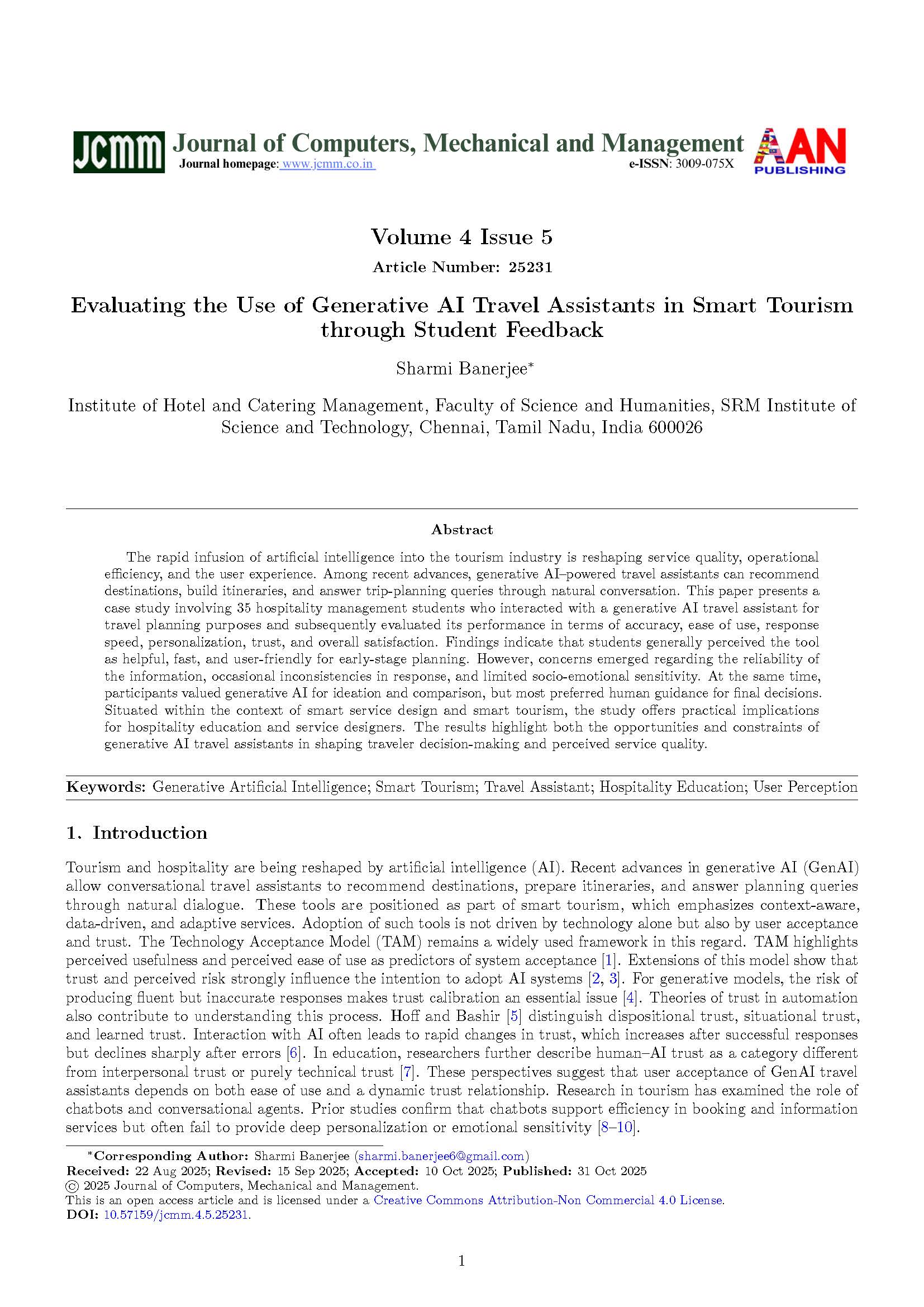Evaluating the Use of Generative AI Travel Assistants in Smart Tourism through Student Feedback
DOI:
https://doi.org/10.57159/jcmm.4.5.25231Keywords:
Generative Artificial Intelligence, Smart Tourism, Travel Assistant, Hospitality Education, User PerceptionAbstract
The rapid infusion of artificial intelligence into the tourism industry is reshaping service quality, operational efficiency, and the user experience. Among recent advances, generative AI–powered travel assistants can recommend destinations, build itineraries, and answer trip-planning queries through natural conversation. This paper presents a case study involving 35 hospitality management students who interacted with a generative AI travel assistant for travel planning purposes and subsequently evaluated its performance in terms of accuracy, ease of use, response speed, personalization, trust, and overall satisfaction. Findings indicate that students generally perceived the tool as helpful, fast, and user-friendly for early-stage planning. However, concerns emerged regarding the reliability of the information, occasional inconsistencies in response, and limited socio-emotional sensitivity. At the same time, participants valued generative AI for ideation and comparison, but most preferred human guidance for final decisions. Situated within the context of smart service design and smart tourism, the study offers practical implications for hospitality education and service designers. The results highlight both the opportunities and constraints of generative AI travel assistants in shaping traveler decision-making and perceived service quality.
References
D. F. Davis, “Perceived usefulness, perceived ease of use, and user acceptance of information technology,” MIS Quarterly, vol. 13, no. 3, pp. 319–340, 1989.
H. Choung, P. David, and A. Ross, “Trust in AI and its role in the acceptance of AI technologies,” arXiv preprint arXiv:2203.12687, 2022.
A. F. Stevens et al., “Theory of trust and acceptance of artificial intelligence in clinical settings,” PMC (medRxiv or similar), 2023.
S. Thorne, “Understanding the interplay between trust, reliability, and human factors in the age of generative AI,” International Journal of Simulation–Systems, Science & Technology, vol. 25, no. 1, 2024.
K. A. Hoff and M. Bashir, “Trust in automation: Integrating empirical evidence on factors that influence trust,” Human Factors, vol. 55, no. 1, pp. 20–31, 2015.
X. J. Yang, C. Schemanske, and C. Searle, “Toward quantifying trust dynamics: How people adjust their trust after moment-to-moment interaction with automation,” arXiv preprint arXiv:2107.07374, 2021.
G. Pitts and S. Motamedi, “Understanding human-AI trust in education,” arXiv preprint arXiv:2506.09160, 2025.
D. Calvaresi, A. Ibrahim, J.-P. Calbimonte, R. Schegg, E. Fragniere, and M. Schumacher, “The evolution of chatbots in tourism: A systematic literature review,” in Information and Communication Technologies in Tourism 2021: Proceedings of the ENTER 2021 eTourism Conference, Jan. 19–22, 2021, pp. 3–16, Springer, 2021.
F. M. Khan and M. K. Azam, “Chatbots in hospitality and tourism: A bibliometric synthesis of evidence,” Journal of the Academy of Business and Emerging Markets, vol. 3, no. 2, pp. 29–40, 2023.
A. Prasanna, P. Pushparaj, and B. P. Kushwaha, “Conversational AI in tourism: A systematic literature review using TCM and ADO framework,” Journal of Hospitality and Tourism Management, 2025.
A. M. Fouad, I. E. Salem, and E. A. Fathy, “Generative AI insights in tourism and hospitality: A comprehensive review and strategic research roadmap,” Tourism and Hospitality Research, p. 14673584241293125, 2024.
H. Li, J. Xi, C. H. C. Hsu, B. X. B. Yu, and X. K. Zheng, “Generative artificial intelligence in tourism management: An integrative review and roadmap for future research,” Tourism Management, vol. 110, p. 105179, 2025.
W. M. To and B. T. W. Yu, “Artificial intelligence research in tourism and hospitality journals: Trends, emerging themes, and the rise of generative AI,” Tourism and Hospitality, vol. 6, no. 2, p. 63, 2025.
M. Orden-Mejía, M. Carvache-Franco, A. Huertas, O. Carvache-Franco, and W. Carvache-Franco, “Analysing how AI-powered chatbots influence destination decisions,” PLOS ONE, vol. 20, no. 3, p. e0319463, 2025.
H. Zhao, B. Yuan, and Y. Song, “Employees’ perception of generative artificial intelligence and the dark side of work outcomes,” Journal of Hospitality and Tourism Management, vol. 61, pp. 191–199, 2024.
O. V. Sergeeva et al., “Understanding higher education students’ adoption of generative AI technologies: An empirical investigation using UTAUT2,” Contemporary Educational Technology, vol. 17, no. 2, p. ep571, 2025.
R. N. Abulail, “Exploring the factors influencing AI adoption intentions in higher education,” Computers, vol. 14, no. 6, p. 230, 2025.
R. H. Mustofa, “The role of subjective norms, ethics, and trust in AI tool adoption among university students,” Computers & Education: Artificial Intelligence, 2025.

Downloads
Published
How to Cite
Issue
Section
License
Copyright (c) 2025 Journal of Computers, Mechanical and Management

This work is licensed under a Creative Commons Attribution-NonCommercial 4.0 International License.
The Journal of Computers, Mechanical and Management applies the CC Attribution- Non-Commercial 4.0 International License to its published articles. While retaining copyright ownership of the content, the journal permits activities such as downloading, reusing, reprinting, modifying, distributing, and copying of the articles, as long as the original authors and source are appropriately cited. Proper attribution is ensured by citing the original publication.





